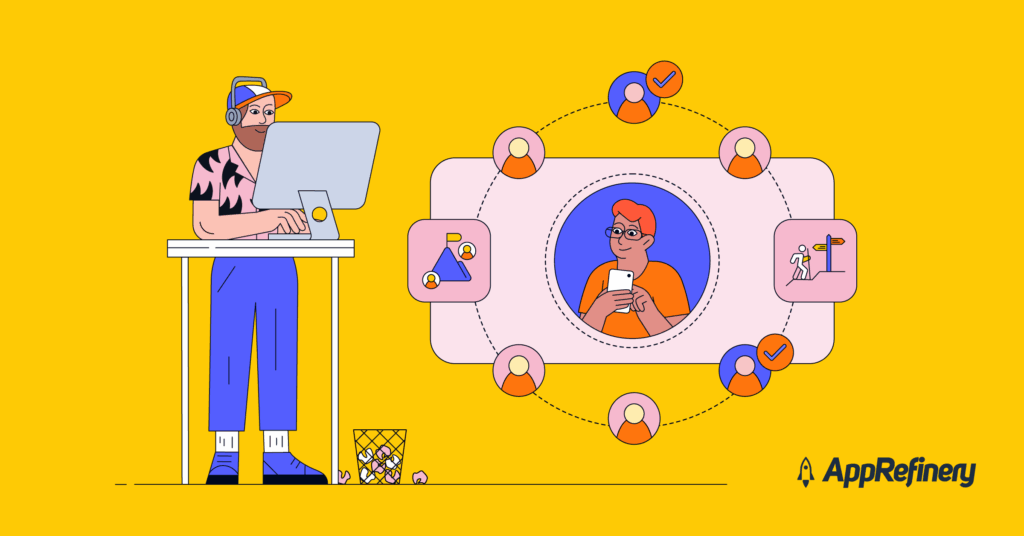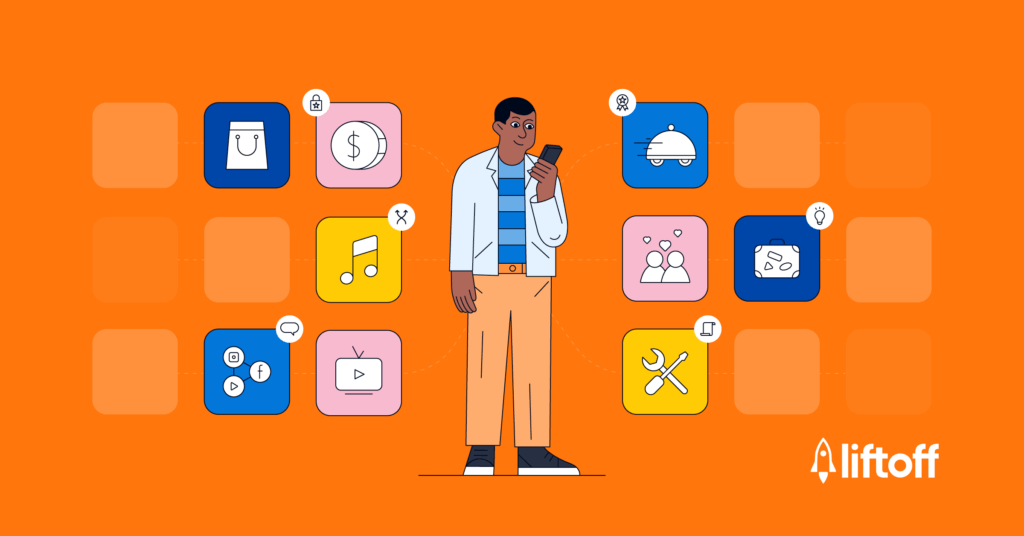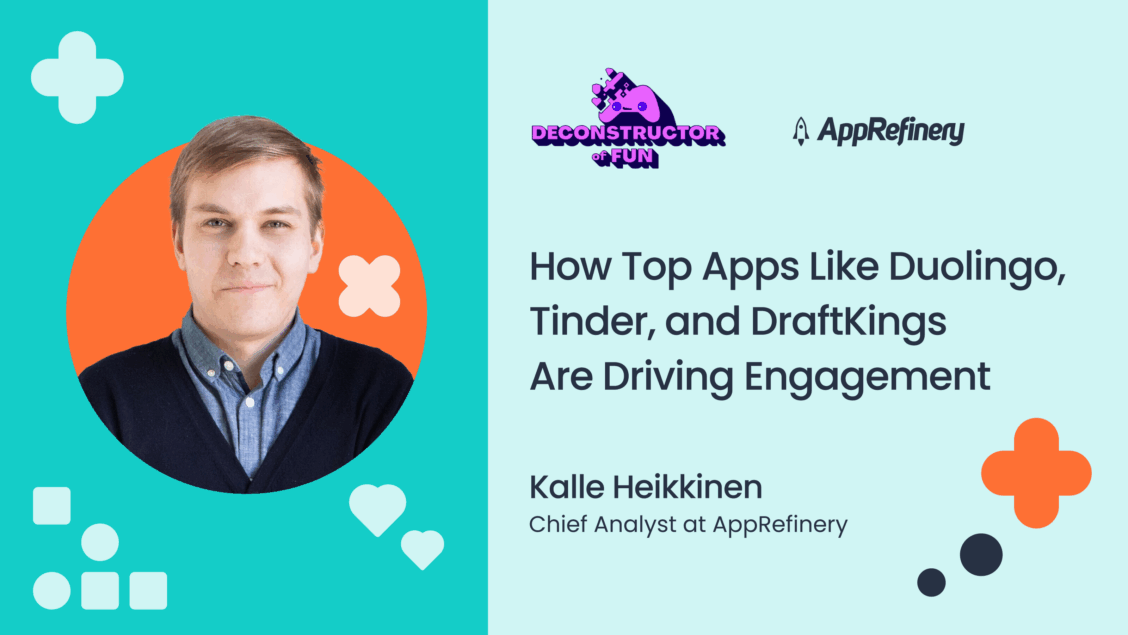
How Top Apps Like Duolingo, Tinder, and DraftKings Are Innovating to Drive Engagement
In a recent episode of the Deconstructor of Fun podcast, I sat down with Michail Katkoff to explore a topic close to my heart: how engagement mechanics typically associated with gaming are finding their way into non-gaming, consumer apps.
Here’s a summary of the standout apps we’ve looked at, including Duolingo, BeReal, Tinder, DraftKings, and Crypto.com. I walk through what they can teach us about building stickier, smarter apps.
If you’re interested in learning more about the engagement strategies of top apps, I invite you to learn more about AppRefinery. We analyze mobile apps at the feature level, helping companies understand how top apps leverage innovative designs and LiveOps techniques to engage, retain, and monetize users across multiple app verticals.
Duolingo: AI-Led Engagement Designed for Retention
Duolingo is recognized as a leader in gamifying education. Their creative, winning approaches to encouraging user engagement are well known. But what makes the app stand out today is its use of AI to expand engagement and monetization, particularly through its top-tier subscription, Duolingo Max.
In particular, our analysts at AppRefinery noted these premium features:
- Roleplay Mode: Interactive, AI-powered conversations that simulate real-life scenarios. Input is scored based on vocabulary richness.
- Explain My Answer: An AI tutor breaks down mistakes on the fly.
- Video Call Lessons: Adds a synchronous, social element to practice.
These features are gated behind Duolingo Max, indicating the app’s willingness to provide a premium experience for a premium fee.
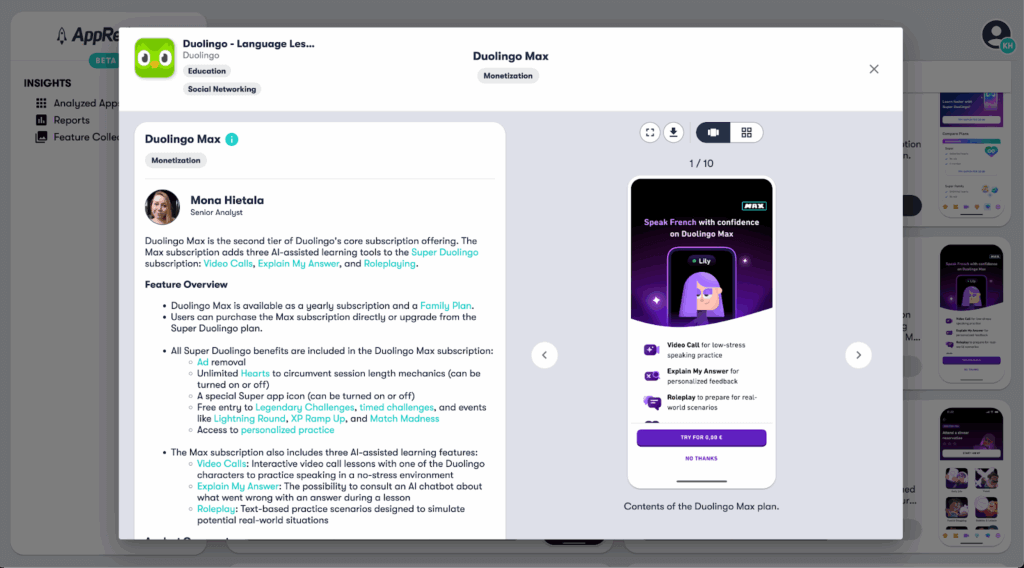
Crucially, Duolingo has transformed practice into app performance, offering features closer to gaming sessions than language drills. In addition, the point gains are tied to progressing through levels. This way, the app builds a retention engine based on interaction rather than repetition.
BeReal: Balancing Engagement and Authenticity
Originally designed as the “anti-Instagram,” BeReal gained traction with a prompt for simultaneous photo posting. Their value proposition has always been clear: one post daily, no filters, no feed-scrolling, and no influencers. However, after its acquisition by Voodoo, the platform has pivoted to introduce additions that look a lot like features from other popular social apps. The additions include:
- Verified brands and influencers with follower mechanics.
- Nearby Feed for passive content consumption.
- Friends of Friends visibility expansion.
- Group Chats with their own daily “Time to BeReal” prompts.
At this stage, these changes create friction between BeReal’s minimalist design (its core value) and the best-practice features in mainstream social platforms.
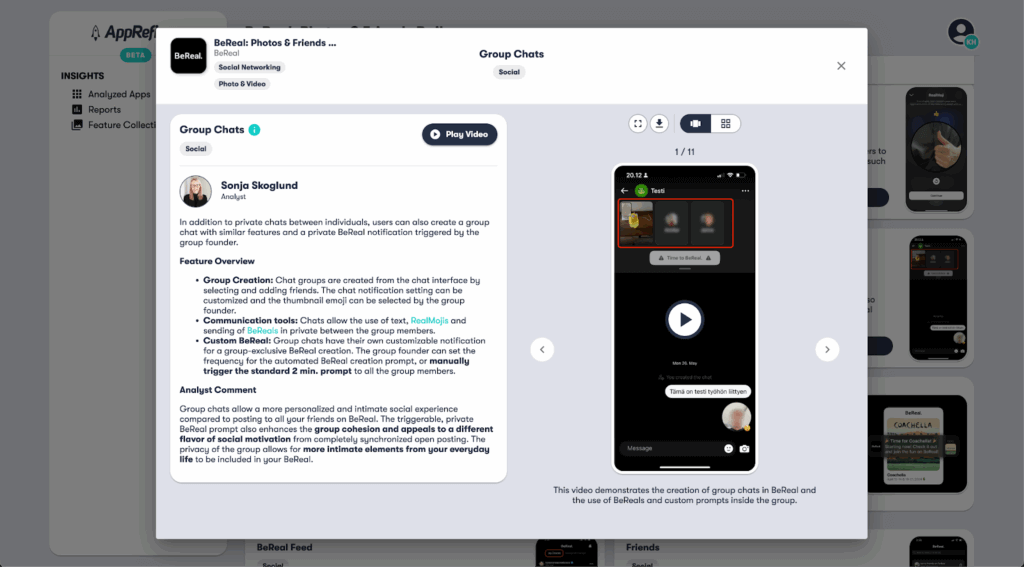
Whether it’s too little, too late—or too much, too soon—is an open question, but the tension between maintaining distinctiveness and chasing engagement is front and center. We’ll be interested in following up on how the new features are received.
Tinder: Taking Dating Beyond Swipes With Limited-Time Events
Tinder is rethinking what dating apps can be by taking inspiration from LiveOps strategies from mobile games. Instead of constant loops of swipes, matches, and messaging, they’ve leaned into seasonal and reactive events that create short bursts of high engagement.
Examples include:
- Swipe Night: A story-driven narrative experience with decision trees that influence post-event matchmaking.
- Vibes: Timed Q&A prompts that appear on user profiles to spark conversations.
- The Game Game: An AI-led conversation coach that gamifies flirtation.
- Swipe Surge: Notifies users when local activity spikes, increasing odds of matching.
These events offer alternative engagement paths beyond the usual swiping and chatting. They’re also highly geo-targeted, which allows Tinder to fine-tune campaigns.
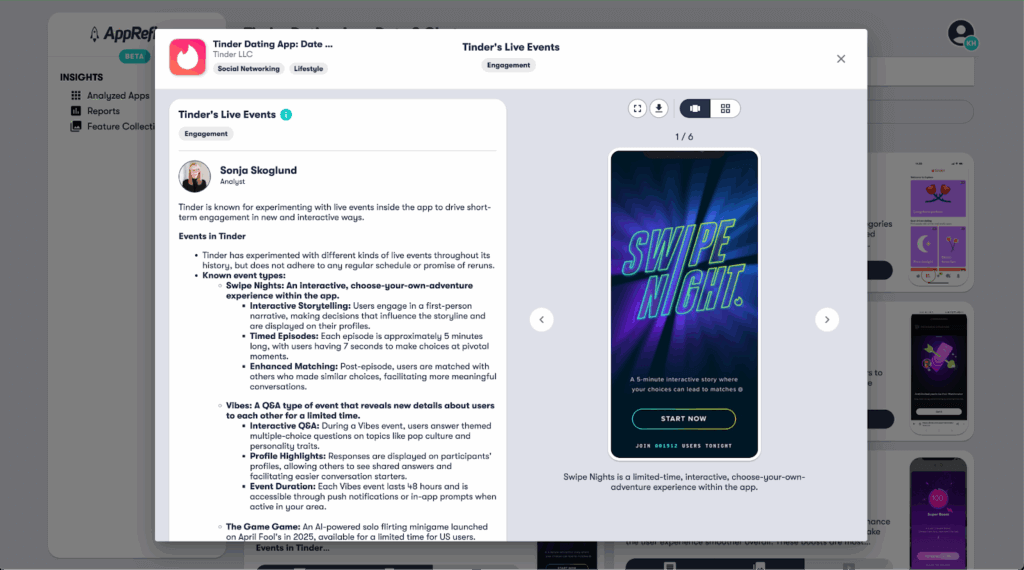
Compared to competitors like Bumble, which primarily stick to static formats, Tinder’s events strategy introduces novelty, urgency, and shared context—a rare combination in this space.
DraftKings: Turning Sports Betting Into a Social Experience
Surprisingly, many sportsbook apps still treat betting as a solitary, transactional task. DraftKings is shifting that model by embedding community and competition into its core. The features include:
- Bet Feed: A social stream of real-time wagers that users can like, comment on, and replicate.
- Betting Groups: Guild-style communities with shared picks, chat, and group engagement.
- Pools: Social prediction contests—often free to enter—that reward leaderboard positioning.
This playbook turns betting into a visible, communal activity. It brings the experience closer to watching a game in a bar with friends rather than checking odds alone. More importantly, it creates daily return reasons even on non-betting days, building repeat behavior through visibility and light competition.
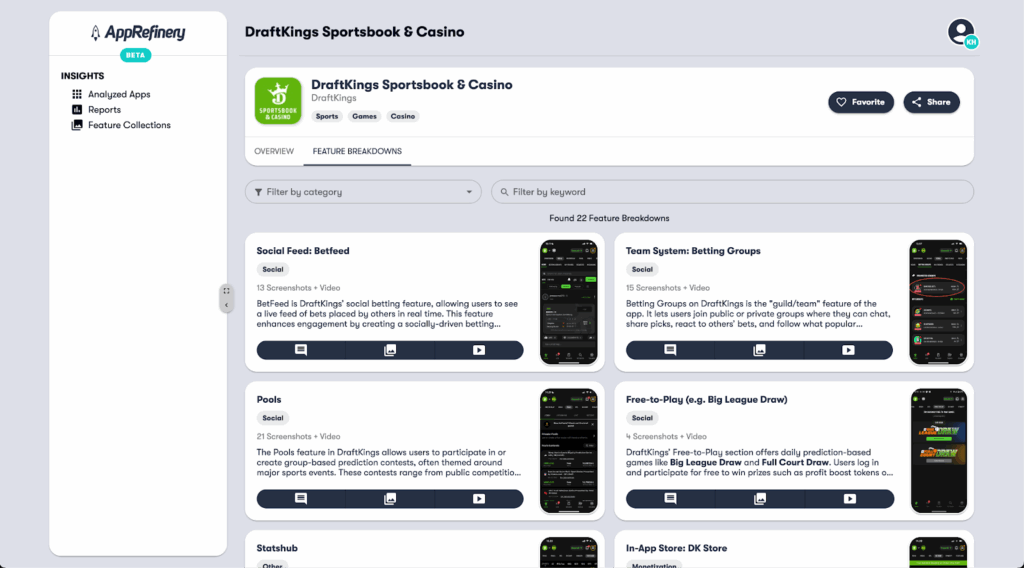
AppRefinery offers a closer look at how DraftKings structures these systems—and where others in the category are falling short.
Crypto.com: Missions, Streaks, and Tokenized Rewards
Crypto.com, originally a utility platform for buying and trading crypto, now incorporates high-impact engagement systems to encourage daily activity. We’ve seen them blend engagement with its token economy in a way closer to mobile games than traditional fintech.
Engagement systems include:
- Daily Missions and Onboarding Tasks: Rewarded with in-app “diamond” currency.
- Badges and Achievement Tiers: Progression visuals that add status to transactional activity.
- Streak Bonuses: Light-touch re-engagement mechanics for daily check-ins.
- Diamond Store: A dedicated redemption hub for merch, subscriptions, and even mystery boxes with randomized token payouts.
Because Crypto.com can reward with its token (Cronos), it creates a closed loop where in-app behavior directly translates to value.
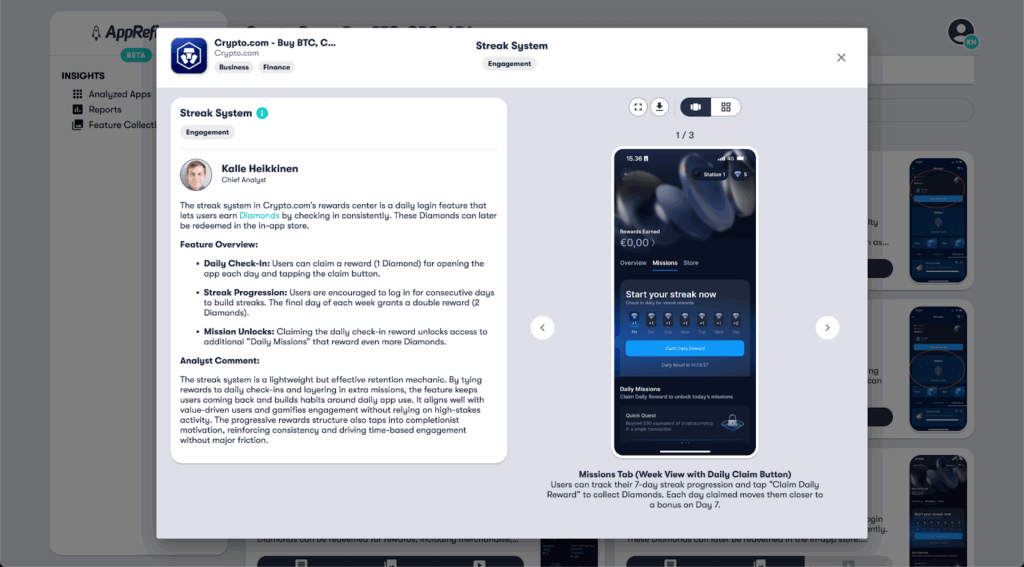
This strategy encourages usage on quiet market days and positions the app as a trading tool and a finance product that users are meant to “play with.”
Final Thoughts
If there’s one takeaway from these five case studies, it’s this: mechanisms once exclusive to games are becoming table stakes for top-performing non-gaming apps. Whether it’s Duolingo reinventing learning with AI, Tinder creating urgency through timed content, or DraftKings embedding social behaviors into betting, we’re seeing intentional design choices driving real results.
At AppRefinery, we map these systems feature by feature across categories to help teams benchmark against the most effective strategies in the market. In today’s app economy, differentiation doesn’t just come from attention-grabbing features—it comes from building systems that give users more reasons to return.
Want to know more about leveraging our insights to build successful apps? Schedule a demo with us.
